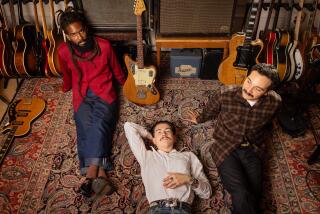A Joyous Face Unto the Lord
David Roche, 56, is a Californian who tours worldwide as a solo stage act. His alter ego is Rev. Dave of the Church of 80% Sincerity. An odd name, but wait till you see his face.
Roche, from the Bay Area, has a hemangioma, a network of purplish blood vessels and sagging skin down the left side of his face, plus an enlarged tongue of the same color and burn marks from radiation therapy.
Rev. Dave onstage: “It’s the church of choice for recovering perfectionists. You can be 80% sincere 100% of the time or 100% sincere 80% of the time, it makes no difference. The point is, 20% of the time, you get to be yourself.”
Roche explains: “You don’t have to be perfect and, of course, that comes from my experience in being facially disfigured, where I’ve had to learn to accept the fact that, hey, I’m flawed. And not just to say, ‘Oh, it’s OK to be flawed,’ but there’s something to be gained from it.”
Rev. Dave, scanning the audience: “How do you people tell each other apart?”
Like Rev. Dave, I was born with a facial deformity: a cleft lip and palate. It’s virtually disappeared, thanks to multiple surgeries, but it still exists--all of it.
We have another thing in common: We and two others were in my documentary about the trials of growing up with a facial birth defect--the surgeries, the ridicule and the fight to get over it all. The film was a four-year uphill climb, on all levels, and I was relieved to be finished with the subject.
But in 1998, because of a sudden filming opportunity and a friend’s nudge, my next subject was Rev. Dave’s career. I plan to finish early next year.
I’m wondering if this is unfinished business by my now-invisible birth defect.
Because I was ridiculed and beaten up with some regularity in grade school, I was ripe for an inferiority complex. After 10 surgeries on my mouth, nose, throat and middle ear, I was pretty much “fixed” by high school. In fact, I was considered good-looking. But the complex had been busy all those years: If I wasn’t worth anything because of my looks in grade school, maybe I was worth something now. I was finally a member of “us” and not the dreaded “them.” Image was Job One.
Meanwhile, in the Roche household, the policy on young David’s face was “total denial--and loving support.” When he was 13 and applied to a seminary, his face didn’t pass the comfort test and he was rejected. He persisted and entered another seminary but eventually left, realizing he’d used it as a shelter from the world. He tried other spiritual paths, including alcohol, communism and pints of Haagen-Dazs at bedtime. But a public-speaking gift was fermenting inside because his father had practiced it professionally and his parents encouraged it at the dinner table. Roche now tried it in workshops, maintaining the same “total denial,” but the spotlight quickly made that absurd. “Grudgingly, I started talking about it.”
He would soon take it completely on faith that his calling lay not in turning his back on his face but putting it right up front.
Onstage: “When I count to three and point, I want you all to ask, in a nice, conversational tone, ‘What happened to your face?’ Ready?”
You can’t call him a comedian, because he also relives harrowing moments onstage: being pinned against a barroom door by a drunken bouncer who’s yelling, “Hey, everybody, look what’s tryin’ to get in tonight!”
His agent gets him gigs everywhere from schools to giant corporate conventions, but Rev. Dave particularly likes places of worship. Every year at Rosh Hashana he performs for the same Jewish congregation. He’s performed for Japanese Buddhists, Methodists, Unity members and Catholic high school students.
He’s also an evangelist on the art of storytelling. He leads workshops called “Your Story Must Be Told.” In middle schools, he and his wife present “Love at Second Sight,” on how their relationship began and flourishes.
One thing he’s learned: “To bring an audience in, you have to love everyone in that story, including yourself. If you’re talking about some person, condemning them, making fun of them, an audience might not want to come into that story.”
Audience reactions can be unpredictable. After one show, “a very beautiful woman came into my dressing room, started crying and revealed that she wanted to disfigure her face because nobody really listened to her or took her seriously.”
After other shows, people have asked him when the Church of 80% Sincerity holds its services.
He quit his day job in 1997.
“I wake up some mornings and think I’m crazy. But my morning prayers are designed to get me in touch with reality. So if I look at what the facts are, then things are good.”
What appeared to be a wound is actually a portal. After thousands of round trips through it, he now says, “My face does not belong to me.”
If that’s true for him, isn’t it true for any of us? And isn’t that a relief?
*
Mike Grundmann is a copy editor for The Times’ Orange County edition. His documentary “Face First” will air on KOCE-TV Channel 50 at 3:30 p.m. Sunday.
*
On Faith is a forum for Orange County clergy and others to offer their views on religious topics of general interest. Submissions, which will be published at the discretion of The Times and are subject to editing, should be delivered to Orange County religion page editor William Lobdell.
More to Read
The biggest entertainment stories
Get our big stories about Hollywood, film, television, music, arts, culture and more right in your inbox as soon as they publish.
You may occasionally receive promotional content from the Los Angeles Times.










